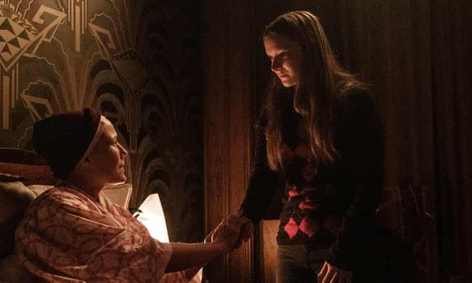B+ | A hyper-religious hospice nurse clashes with her blunt new patient. Directed by Rose Glass Starring by Morfydd Clark and Jennifer Ehle Review for Jon Kissel |

In unsympathetic opposition to Maud is the great Jennifer Ehle as a modern dance maven turned terminal cancer patient. Ehle’s Amanda chases her medicine with booze and is the kind of cancer patient who, in her preference for cigarettes, wonders where the harm is in one more carcinogen. Maud sees some of her former self in Amanda, in that her attempts at problem-solving through physical pleasure or intoxicants are insufficient. Ehle’s best moment is after an assignation with girlfriend/sex worker Carol (Lily Frazer), where Maud watches Amanda’s face fall from the shadows. Where Maud sees spiritual unfulfillment, Amanda is likely experiencing grief for the looming end of these kinds of experiences. Death for the atheist like Amanda is reckoning with the lack of any comforting lie or story about it being a portal to somewhere else, that it is instead nothing more than a period on the end of a sentence. At its worst, Amanda’s bluntness crescendos in some ugly bullying that severs her and Maud’s professional relationship, but one later gets the sense that she regrets it even as she sticks to her atheist guns. That bleakness and humility is anathema to someone like Maud, to the point that it triggers a full psychotic break when she’s confronted with it.
It’s in the aftermath of Maud’s break with Amanda that Glass is on her wobbliest footing, and not because she’s stepping on nails. Saint Maud wouldn’t be the first film degraded by an off-putting fit of psychedelia. Movies as disparate as Winter’s Bone and Easy Rider both have tone-altering digressions at key points, and Glass is no more successful here. Maud’s moment of doubt comes in the hacky form of quick cuts and an upside-down frame. Most comically in what had otherwise been a withholding film, she literally walks by a man playing a violin that, while not the world’s smallest playing just for her, might as well be. Other instances of nightmare imagery are more successful, often wildly so, as is the recognizably modern horror score by Adam Janota Bzowski. However, these also serve to put the few things that don’t work in sharper relief.
My favorite line in Saint Maud is a tossed-off one from Amanda in reference to an old friend. She says in regard to his hair plugs, “No one sees what they don’t want to,” and here we have what I see as an atheist thesis statement, such that the religious are ignoring everything the universe is telling them as humans understand more and more of it. It’s simply impossible to imagine an old and vast universe that places a unique value on one indistinct corner of it. Where some might want to imagine ethereal angel wings, the truth is pain and fire and indifference. B+
 RSS Feed
RSS Feed